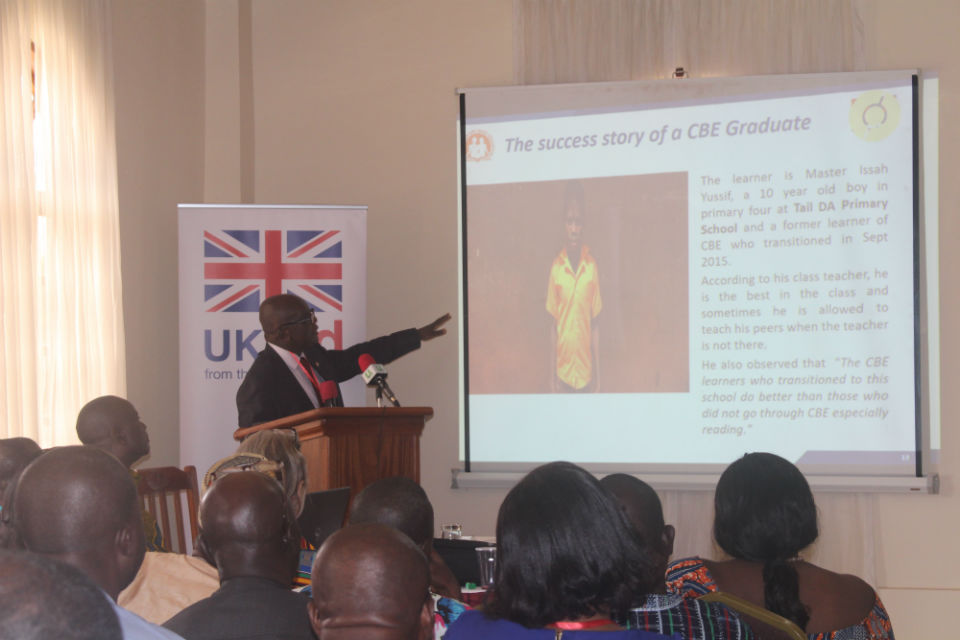DFID Country Director's speech at the CBE Stakeholders' Annual Review
DFID Country Director, Philip Smith, delivered a speech at the CBE Stakeholders' Annual Review.

Honourable Minister of Education Chief Director of Ministry of Education Director General of Ghana Education Service Mr Chair Team Leader of CBE Distinguished representatives of Government Country Directors and other representatives of CSOs/NGOs Members of the Press Corps, Ladies and Gentlemen.
Good morning everyone,
As Country Director for the UK’s Department for International Development in Ghana, it is a pleasure to join you today to celebrate the long history of achievements of the Complimentary Basic Education (CBE) programme and to consider future sustainability and support.
The UK Government has had a longstanding partnership with Ghana to support Education. DFID has been engaged in supporting CBE for the last decade - initially supporting School for Life (SFL) to implement CBE programmes to reach out-of-school children and then moving on to support a more systemic approach focussed on building the capacity of Government and communities to be able to implement the CBE approach.
Investing in good teaching and supporting the most marginalised children access education is at the heart of DFID’s new global education policy ‘Get Children Learning’.
Education has the power to change lives and open the door to better employment, more active citizenship and well-informed health decisions that can benefit future generations. At its best it can transform the prospects of poor and marginalised children and CBE is one programme where we have seen this happening.
With children unable to go to school due to poverty, distance to schools or family demands, this programme has enabled almost 250,000 children to have a second chance at education and the chance to transform their lives through DFID and USAID funding.
Last years’ learner assessment showed that 80 to 85% of learners had significantly improved their literacy and numeracy skills. Evidence from the tracker study, which has monitored these children into primary schools and compared them with a comparison cohort in primary school, has shown that the programme has effectively prepared them for the transition to formal primary school with levels of numeracy being equivalent between CBE and formal primary children and CBE children doing better in local language literacy.
Ladies and gentlemen, A couple of weeks ago I visited a CBE learning centre in Tolon in Northern Region and saw at first hand the strong commitment to the programme from the district authorities, the community and the children. I was struck by how attentive the children were in the classroom, the quality of the local language teaching materials and the enthusiasm of the community facilitator.
After 5 years we are now in the final cycle of support from DFID/USAID for this programme. It is evident that the capacity-building approach of districts and Implementing Partners to work together, supported by Crown Agents, has paid dividends in order to enable CBE to be sustained by the Government of Ghana.
We are also pleased to note that CBE is recognised as part of the Education Sector Plan 2018-2030 and that there are a number of conversations taking place on how to continue to be able to support children who have missed out on the opportunity to enrol in primary school at the right age or who have dropped out to have a second chance.
We are particularly pleased that this year has seen a twin approach with downstream Implementing Partners working with district authorities in 23 districts and GES implementing directly in 14 districts.
This is in line with Ghana’s commitment to move ‘beyond aid’ and finance the education sector to enable every young child, boy and girl, to have access to education.
Honourable Minister, the UK commends the Government of Ghana for its admirable vision of Ghana ‘beyond aid’ and for your ambitious economic transformation plans.
Late last year in London, the British Prime Minister met with His Excellency the President and noted that, as Ghana moves beyond aid, the UK-Ghana relationship is changing from one focused on aid to a partnership of mutual economic benefit.
DFID’s development offer is changing in response. DFID is shifting focus away from large scale resource transfers in Education and other social sectors towards technical assistance and a new UK-Ghana partnership based on economic development, investment, trade and strategic political cooperation.
In Education, our joint work and commitment to the sustainability of CBE is a step on this path.
But whilst the programme to date has helped thousands of children, the scale of the challenge remains. Approximately 450,000 children between the ages of 6 and 14 remain out of school in Ghana. We must continue to ensure the sustainability of this approach, which has proven to be effective and successful, as Ghana moves beyond aid and aims to deliver on its commitment to achieving SDG 4: to ‘Ensure inclusive and equitable quality education and promote lifelong learning opportunities for all’.
With this in mind, I wish you all a successful Annual Review meeting over the next few days and we look forward to continuing the important discussion on how we ensure future cohorts of children who miss out on an education have the chance to access CBE.
Finally, I want to acknowledge and thank our partners on CBE: The Ministry of Education, The Ghana Education Service and the National Service Secretariat for their enthusiasm and commitment to the CBE programme; our Implementing Partners (Afrikids, Action Aid, ProNet, LCD, GILLBT, Care, PLAN, IBIS/OXFAM, School for Life, and World Education); Crown Agents, IMC Worldwide and UNICEF; and, finally, the communities who have made the programme the success that it is.
We are grateful to all stakeholders for the achievements made so far on the CBE programme. We thank you for joining with the United Kingdom and the USA in this venture which has enabled almost 250,000 Ghanaian children to have the second chance at an education that we hope will transform their lives.
Thank you.